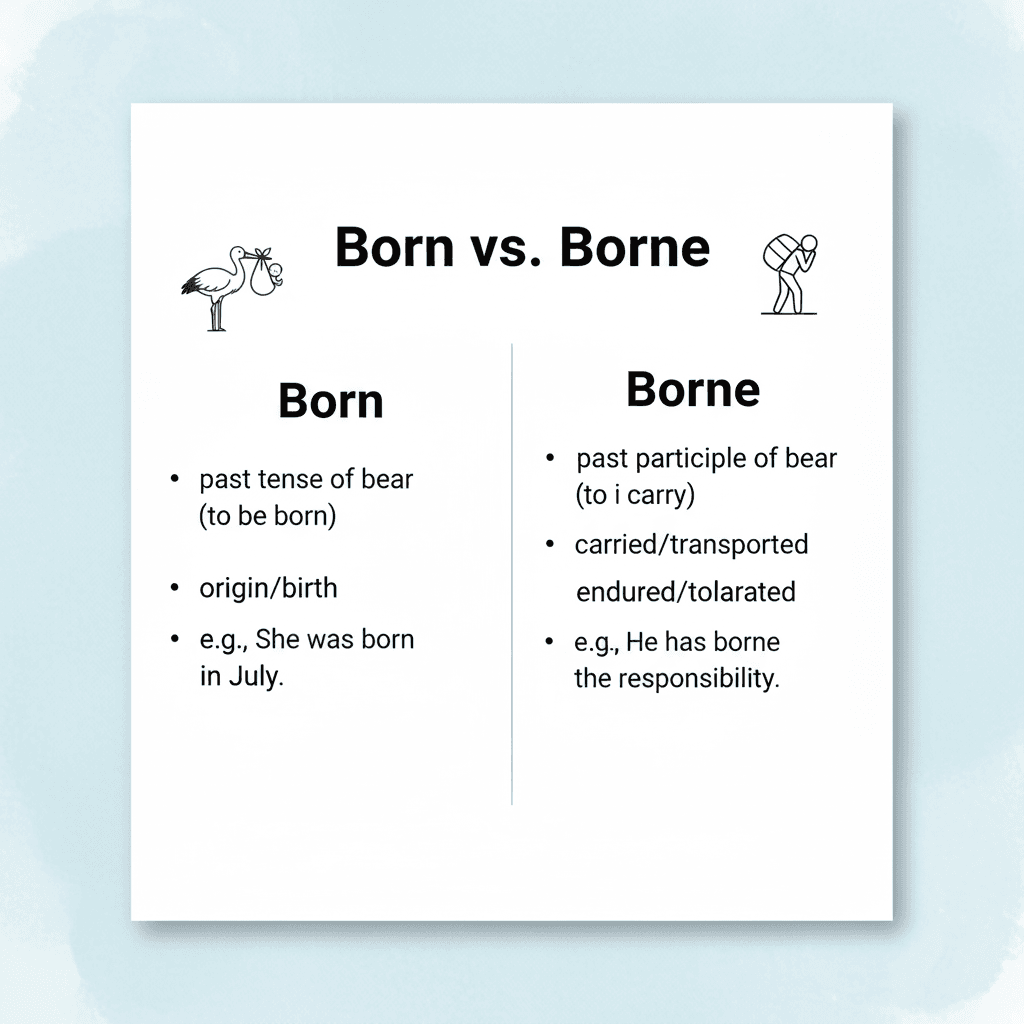Born vs. Borne: What’s the Difference?
 The words born and borne both come from the verb bear, which means to carry, support, or give birth to.
The words born and borne both come from the verb bear, which means to carry, support, or give birth to.
But their meanings have split over time depending on context.
Here’s the quick rule:
- Born → used for birth or origin 👶
- Borne → used for carrying, enduring, or transporting 🚚
1. Born: Related to Birth or Origin
Meaning
“Born” is used when talking about birth, origin, or inherent qualities.
It’s the past participle of bear when referring to giving birth or coming into existence.
Examples (10 total)
- She was born in London.
- A new idea was born from their discussion.
- He was born into a wealthy family.
- The twins were born in June.
- The movement was born out of frustration.
- She was born with a natural talent for music.
- A star is born when gas clouds collapse.
- I was born ready!
- The company was born from a small startup.
- He’s a born leader.
🧠 Tip:
If it refers to birth, beginning, or nature, use born.
2. Borne: Related to Carrying or Enduring
Meaning
“Borne” is used for carrying, holding, supporting, or enduring something — either physically or emotionally.
It’s the past participle of bear in all cases except childbirth.
Examples (10 total)
- The weight was borne by the steel beams.
- She has borne great hardship in her life.
- The responsibility was borne by the manager.
- Diseases borne by mosquitoes are dangerous.
- The cost will be borne by the company.
- He has borne the pain with great strength.
- The damage was borne by the insurance firm.
- The risk was borne equally by both partners.
- Airborne particles can cause allergies.
- The news was borne to him by a messenger.
🧠 Tip:
If it means carried, endured, or transported, use borne.
3. Quick Comparison Table
| Context | Correct Form | Example | Meaning |
|---|---|---|---|
| Birth / Origin | Born | She was born in 1998. | Came into life or existence |
| Natural ability | Born | He’s a born artist. | Naturally gifted |
| Carried / Supported | Borne | The load was borne by two men. | Carried physically |
| Endured / Tolerated | Borne | She has borne many difficulties. | Endured hardship |
| Spread / Transported | Borne | Water-borne diseases are dangerous. | Carried through something (air, water, etc.) |
4. How to Remember
👉 Born = when something comes into life or begins.
👉 Borne = when something is carried or endured.
💡 Memory Trick:
“Born” has no “e” — just like “life” starts simple.
“Borne” has an “e” — like “endure” or “effort.”
5. Common Mistakes
❌ She has borne in New York.
✅ She was born in New York.
❌ The pain was born bravely.
✅ The pain was borne bravely.
❌ A new idea was borne in my mind.
✅ A new idea was born in my mind.
6. Why It’s Confusing
Both forms come from the same verb — “to bear.”
Over time, English separated them to clarify meaning:
- Born → life and creation
- Borne → carrying and endurance
This helps readers instantly understand whether you’re talking about a birth or a burden.
Modern grammar checkers like Humanizey can catch these subtle errors automatically, adjusting your tone and context for clarity.
FAQs
1. Is “borne” ever used for birth?
Only in very old English. Today, born is always used for birth.
2. What does “borne out” mean?
It means confirmed or supported by evidence.
Example: His theory was borne out by the data.
3. What about “airborne” and “waterborne”?
These mean carried by air or carried by water — so they use borne.
4. Is “born of” correct?
Yes. It means resulting from or coming from.
Example: The idea was born of curiosity.
Practice: Choose the Correct Word (“Born” or “Borne”)
(Answers are listed at the end.)
- She was ___ in Paris.
- The heavy load was ___ on his shoulders.
- A new tradition was ___ out of love.
- He has ___ the pain with courage.
- The disease is water-___.
- I was ___ to be a teacher.
- The expense was ___ by the client.
- The message was ___ across the sea.
- She was ___ into a musical family.
- The weight was ___ by two workers.
Answers
- born
- borne
- born
- borne
- borne
- born
- borne
- borne
- born
- borne
